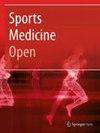Anterior Cruciate Ligament Return to Sport after Injury Scale (ACL-RSI) Scores over Time After Anterior Cruciate Ligament Reconstruction: A Systematic Review with Meta-analysis
IF 4.1
2区 医学
Q1 SPORT SCIENCES
引用次数: 0
Abstract
Psychological readiness is an important consideration for athletes and clinicians when making return to sport decisions following anterior cruciate ligament reconstruction (ACLR). To improve our understanding of the extent of deficits in psychological readiness, a systematic review is necessary. To investigate psychological readiness (measured via the Anterior Cruciate Ligament-Return to Sport after Injury scale (ACL-RSI)) over time after ACL tear and understand if time between injury and surgery, age, and sex are associated with ACL-RSI scores. Seven databases were searched from the earliest date available to March 22, 2022. Articles reporting ACL-RSI scores after ACL tear were included. Risk of bias was assessed using the ROBINS-I, RoB-2, and RoBANS tools based on the study design. Evidence certainty was assessed for each analysis. Random-effects meta-analyses pooled ACL-RSI scores, stratified by time post-injury and based on treatment approach (i.e., early ACLR, delayed ACLR, and unclear approach). A total of 83 studies were included in this review (78% high risk of bias). Evidence certainty was ‘weak’ or ‘limited’ for all analyses. Overall, ACL-RSI scores were higher at 3 to 6 months post-ACLR (mean = 61.5 [95% confidence interval (CI) 58.6, 64.4], I2 = 94%) compared to pre-ACLR (mean = 44.4 [95% CI 38.2, 50.7], I2 = 98%), remained relatively stable, until they reached the highest point 2 to 5 years after ACLR (mean = 70.7 [95% CI 63.0, 78.5], I2 = 98%). Meta-regression suggests shorter time from injury to surgery, male sex, and older age were associated with higher ACL-RSI scores only 3 to 6 months post-ACLR (heterogeneity explained R2 = 47.6%), and this reduced 1–2 years after ACLR (heterogeneity explained R2 = 27.0%). Psychological readiness to return to sport appears to improve early after ACL injury, with little subsequent improvement until ≥ 2-years after ACLR. Longer time from injury to surgery, female sex and older age might be negatively related to ACL-RSI scores 12–24 months after ACLR. Due to the weak evidence quality rating and the considerable importance of psychological readiness for long-term outcomes after ACL injury, there is an urgent need for well-designed studies that maximize internal validity and identify additional prognostic factors for psychological readiness at times critical for return to sport decisions. Registration: Open Science Framework (OSF), https://osf.io/2tezs/ .前交叉韧带重建后随时间变化的前交叉韧带损伤后恢复运动量表 (ACL-RSI) 评分:系统回顾与元分析
前交叉韧带重建(ACLR)后,运动员和临床医生在做出重返运动场的决定时,心理准备是一个重要的考虑因素。为了提高我们对心理准备缺陷程度的认识,有必要进行一次系统回顾。研究前交叉韧带撕裂后一段时间内的心理准备情况(通过前交叉韧带-受伤后重返运动量表(ACL-RSI)进行测量),并了解受伤与手术之间的时间、年龄和性别是否与 ACL-RSI 评分相关。研究人员检索了从最早可用日期到 2022 年 3 月 22 日的七个数据库。纳入了报告前交叉韧带撕裂后 ACL-RSI 评分的文章。根据研究设计使用 ROBINS-I、RoB-2 和 RoBANS 工具评估偏倚风险。对每项分析的证据确定性进行评估。随机效应荟萃分析按受伤后时间和治疗方法(即早期 ACLR、延迟 ACLR 和不明确方法)对 ACL-RSI 评分进行了汇总。本综述共纳入 83 项研究(78% 存在高偏倚风险)。所有分析的证据确定性均为 "弱 "或 "有限"。总体而言,与 ACLR 术前(平均值 = 44.4 [95% CI 38.2, 50.7],I2 = 98%)相比,ACLR 术后 3 至 6 个月的 ACL-RSI 评分较高(平均值 = 61.5 [95% 置信区间 (CI) 58.6, 64.4],I2 = 94%),并保持相对稳定,直至 ACLR 术后 2 至 5 年达到最高点(平均值 = 70.7 [95% CI 63.0, 78.5],I2 = 98%)。元回归表明,从受伤到手术的时间较短、男性和年龄较大与 ACLR 术后 3 至 6 个月较高的 ACL-RSI 评分有关(异质性解释 R2 = 47.6%),而在 ACLR 术后 1 至 2 年,这一比例有所下降(异质性解释 R2 = 27.0%)。在前交叉韧带损伤后早期,恢复运动的心理准备似乎有所改善,但在前交叉韧带修复术后≥2年后才有所改善。从受伤到手术的时间较长、女性和年龄较大可能与前交叉韧带重建术后 12-24 个月的 ACL-RSI 评分呈负相关。由于证据质量评级较弱,而心理准备对于前交叉韧带损伤后的长期结果相当重要,因此迫切需要设计良好的研究,以最大限度地提高内部有效性,并在决定是否重返运动场的关键时刻确定心理准备的其他预后因素。注册:开放科学框架(OSF),https://osf.io/2tezs/ 。
本文章由计算机程序翻译,如有差异,请以英文原文为准。
求助全文
约1分钟内获得全文
求助全文

 求助内容:
求助内容: 应助结果提醒方式:
应助结果提醒方式:


